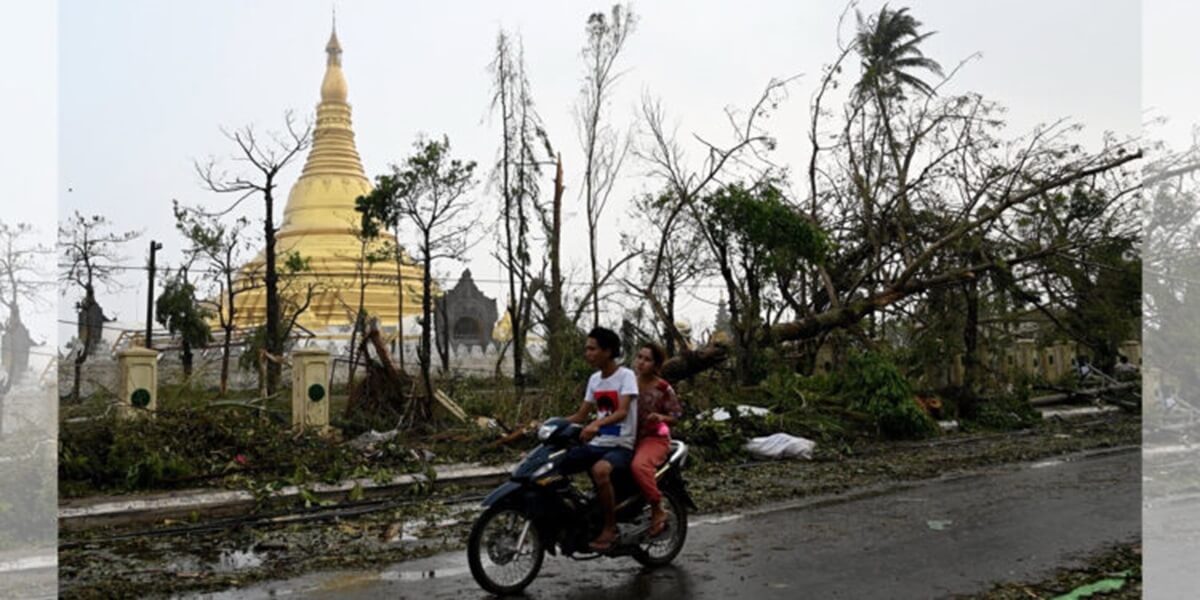Under Media Blackout, the Hidden Devastation of Myanmar’s Environment
Nyein Nyein | 08 May 2024
Myanmar faced a record-breaking temperature rise in April with Chauk in Magwe Region named as the world’s second-hottest city after the mercury there climbed above 48 degrees Celsius (118F).
Over a dozen townships across the country recorded new temperature highs in April, according to Myanmar’s meteorology and hydrology department.
Suffering most amid the hottest days of their lives are the 2.8 million displaced residents who have abandoned their homes due to the fighting.
Lakes and wells have dried up. Accessing water has become a serious challenge. And rising sea levels in coastal regions are causing salination that is destroying crops and other food sources.
Myanmar’s people have suffered the effects of climate change for decades, with extreme heat, drought and the devastating storm Nargis in May 2008 and Mocha in May 2023.
The country suffered the world’s second-highest impacts from climate change between 2000 and 2019, according to the Climate Change Risk Index. While no updates have been published since then, Myanmar currently tops the list of most affected countries due to its heatwave.
Asia remained the world’s most disaster-hit region due to weather, climate and water-related impacts in 2023, according to the World Meteorological Organization.
The extreme temperatures have spurred wave after wave of suggested remedies on social media including Facebook.
One calls for planting more trees. People debate which kind of trees will protect groundwater or absorb more carbon to reduce emissions. Some of the cited evidence is credible and scientific but much is mere wishful thinking.
Myanmar’s independent media have done a far better job, publishing verified and accurate information along with climate developments and feedback from the public. Environmental reporting has mostly focused on consequences of extraction of both marine and land natural resources including deforestation, as well as accountability for and possible solutions to climate change impacts.
“Myanmar still possesses a vast amount of high-quality natural resources including forestland,” veteran environmentalist U Win Myo Thu, a research fellow at Oxford University, told The Irrawaddy earlier this year.
He said that deforestation remains a big problem however, citing research findings.
The globe has set a target to achieve zero deforestation by 2030. The National League of Democracy (NLD) government under the now-imprisoned Daw Aung San Suu Kyi proposed a plan to reduce deforestation in Myanmar by 50 percent. However, Oxford researchers found that “Myanmar won’t be able to meet this national target” under its current military rulers.
The NLD government had planned to draft a national climate change adaptation policy by this year, but the military coup put an end to that plan. Illegal logging meanwhile continues to ravage Myanmar’s forests amid the chaos of conflict, despite calls from environmentalists for a halt to the illegal industry.
The largely unregulated logging and mining sectors are driving mass deforestation and contamination of water resources near sites extracting gold, jade and other minerals.
The main blame lies with the junta, which has neglected its duty to oversee these extraction projects while favoring military-backed companies when it comes to mining concessions.
Myanmar’s independent media has covered such environmental developments extensively despite a news cycle dominated by politics and conflict.
Reporting has spotlighted issues of air pollution; plastic waste in rivers, lakes and oceans; impacts of dam projects on humans and the ecosystem, and the potential disadvantages of planned mega hydropower projects.
The bravery involved in environmental reporting under junta rule was highlighted by UNESCO Myanmar, which stated: “[J]ournalists covering environmental issues face many threats and forms of violence. These range from physical violence, surveillance, pressure, or intimidation by national and transnational companies that could be affected by their activities, to the imposition of official controls and the pernicious use of the state apparatus, as well as filters and content moderation to restrict access to information.”
The regime’s oppression and continuing threats and attacks against Myanmar journalists and media outlets have become more systematic, widespread, and intense in the three years since the February 2021 coup. Tight restrictions remain on people’s access to information, rights to report and freedom of expression on any issues deemed detrimental to the junta.
Myanmar is ranked 171st out of 180 countries in the Reporters Without Borders Press Freedom Index 2024, in a “very serious” situation just one place above its giant neighbor China (172).
Independent journalists inside Myanmar continue to work in hiding, but many have been forced to quit the profession. The fewer messengers (professional journalists) reporting verified information, the weaker independent scrutiny of events in the country becomes.
Also being strangled is people’s ability to speak out on projects that are affecting their environment, including resource extraction and the loss of forest and water resources.
World Press Freedom Day – which falls today, May 3 – thus contains special meaning for Myanmar with its theme “A Press for the Planet: Journalism in the Face of the Environmental Crisis”.
UNESCO’s Myanmar office emphasizes the global theme “calls attention to the very difficult and interrelated tasks of defending press freedom, protecting the environment, and addressing climate change.”
Researcher Dr. Ashley South points out that Myanmar has contributed little to climate change yet is highly vulnerable to its impacts.
Myanmar cannot neglect environmental preservation, he said.
However, those preservation efforts can only be successful if journalists have the right to access information for timely and comprehensive coverage of environmental issues and their consequences. Without this crucial oversight, resource plunder will continue unabated under junta rule, bringing a higher and higher toll from climate change impacts.
Nyein Nyein, Journalist.
This article was originally published on The Irrawaddy.
Views in this article are author’s own and do not necessarily reflect CGS policy.
